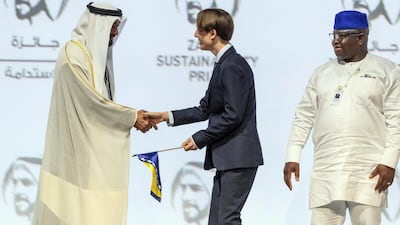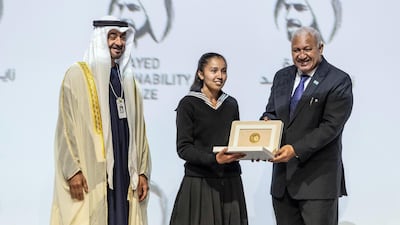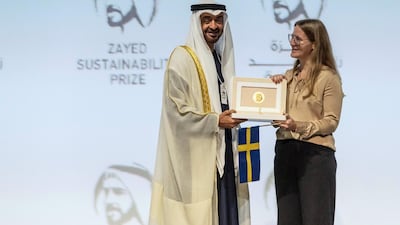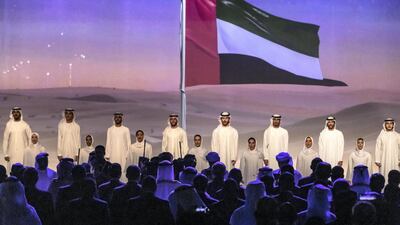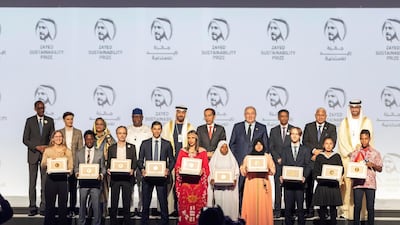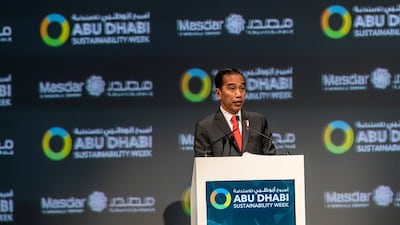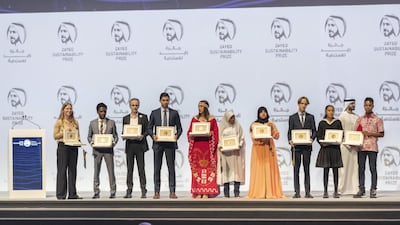A teenager from Ghana who began teaching himself how to code just three years ago was crowned a winner of the Zayed Sustainability Prize on Monday.
Mustapha Haqq, 18, was awarded Dh2.2 million ($600,000) to help develop a smartphone application which helps farmers identify and treat plant disease.
The company he co-founded, Okuafo Foundation, was among 10 winners of the 2020 prize who will share a combined total of Dh11m ($3m) in funding.
A delighted Mustapha held his head in his hands as his project was announced a winner at the Abu Dhabi Sustainability Week in the capital.
"No one in my family owned a computer," he told The National. "But I realised technology had the ability to change critical issues like drought and hunger.
“Mark Zuckerberg started Facebook from his dorm room and now connects more than two billion people.
“I thought, ‘I can do that’. Maybe I can connect four billion people.”
Growing up in a slum in Ghana, Mustapha said he had always been inspired by big tech entrepreneurs like Zuckerberg.
Spending his days at computer cafes in his local town, he said many teenagers around him were using the internet to “scam people and commit fraud”.
“I just taught myself to code via YouTube videos,” he said.
In 2018, the aspiring entrepreneur developed a mobile app to help improve the lives of local farmers.
Many he spoke to were losing significant crop yield due to harmful pests like the fall armyworm, an insect common to North and South America and first reported in Africa in 2016.
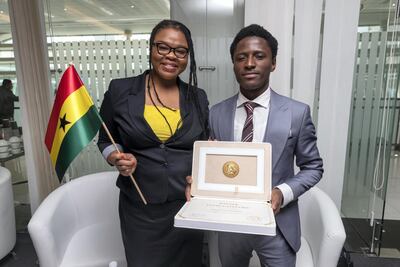
Using artificial intelligence and data analytics, Mustapha’s app helps to mitigate widespread damage to farm produce.
“It basically predicts and detects crop diseases and infestations, then offers scientific solutions in real-time,” he said.
“Farmers can act and limit the impact to crops much quicker through smart technology.”
With the Dh2.2m cash boost from the prize, the innovative youngster said the next phase of his project was to reach more farmers.
“Through our project we select farmer leaders who help us to promote the work we do,” he said.
“Using the money, we can travel to hard to reach communities and engage and support more farmers about crop safety.”
Since 2008, the UAE’s Zayed Sustainability Prize has been at the centre of a global effort to harness new technologies to change lives for the better.
Launched by Sheikh Mohamed bin Zayed, Crown Prince of Abu Dhabi and Deputy Supreme Commander of the Armed Forces, it has grown to become one of the most significant awards worldwide for affecting positive change.
Monday’s 10 winners were spread across five prize categories including health, food, energy, water and education.
“Today, we honour the winners of the Zayed Sustainability Prize, the pioneer in sustainable development and humanitarian work,” said Sheikh Mohamed on Twitter.
In a tender moment on stage, Sheikh Mohamed embraced 15-year-old Buretaake Ioane from the Republic of Kiribati in the central Pacific Ocean.
Ioane’s school, Eutan Tarawa Ieta Junior Secondary School, won first place in its region in the Global High Schools category.
"I was shocked, excited, but really I couldn't believe it. That is why I hugged his highness so tightly," he told The National.
“It was the only way I could show him my true appreciation for what this means for my small school back home.”
With the prize money, he said his teachers aimed to convert part of the school grounds into a food production area, with a vegetable garden and large chicken barn.
Other winners, this time in the energy category, were the French non-profit Electricians Without Borders.
With more than 30 years of experience working in more than 50 countries, the organisation provides solar equipment to refugee camps and rural communities.
“We were finalists in 2016 but never won. It was a bitter disappointment,” said Herve Gouyet, president of EWB.
“But today, wow, the feeling is unbelievable. I think that loss four years ago made this win even more important for us.
“I texted my daughter to give her the good news but she hasn’t responded yet.”
With an aim to “enforce the skills of a population”, EWB is “less about expensive technology” and more about empowerment.
Mr Gouyet said the organisation deliberately focused on simple but effective equipment to guarantee the support of its users and get results.
“We use basic technology. If it was too sophisticated these people would lose confidence in renewable energy,” he said.
“We light communities through solar electricity and train people to have the skills to maintain the equipment.”

With the cash injection offered by the prize money, Mr Gouyet said they aimed to launch a project at a Rohingya refugee camp in Bangladesh.
“To train about 20 electricians to service and maintain power to 50,000 shelters costs around $100,000 (Dh367,000),” he said.
“That $600,000 (Dh2.2 million) fund could help us scale the project six-fold, benefiting 300,000 refugees.”
This year, a total of 2,373 projects put their work forward in the hope of winning the 2020 edition of the prize.
In October last year, a 12-member jury whittled down that number to a shortlist of 30 finalists.
A total of six schools from six regions were also awarded Dh367,000 ($100,000) each for their work in developing renewable energy solutions.
During the awarding ceremony, organisers told how Globhe, winner of the health category, used imaging from drones as well as AI to help identify potential public health emergencies in the developing world.
Detailed analysis can, for example, detect malaria mosquito breeding sites as well as areas at risk from cholera outbreaks.
The winners
Health: Globhe
Utilises drone data to help prevent and respond to disease outbreaks and natural disasters
Food: Okuafo Foundation
Helps farmers identify and treat plant diseases and pests through a smartphone app
Energy: Electricians without Borders
Provides high-quality solar equipment and training to people in rural communities and refugee camps
Water: Ceres Imaging
Provides farmers with aerial images to help grow crops more efficiently
Education:
‘Global High Schools’
Americas - Air Batalla - Columbia
Sub-Saharan Africa – Hakimi Aliyu Day Secondary, Nigeria
Middle East and North Africa - Al Amal Junior High School, Morocco
Europe and Central Asia - United World College Mostar- Bosnia and Herzegovina
South Asia - Bloom Nepal School, Nepal
East Asia and Pacific - Eutan Tarawa Ieta Junior Secondary School, Republic of Kiribati







